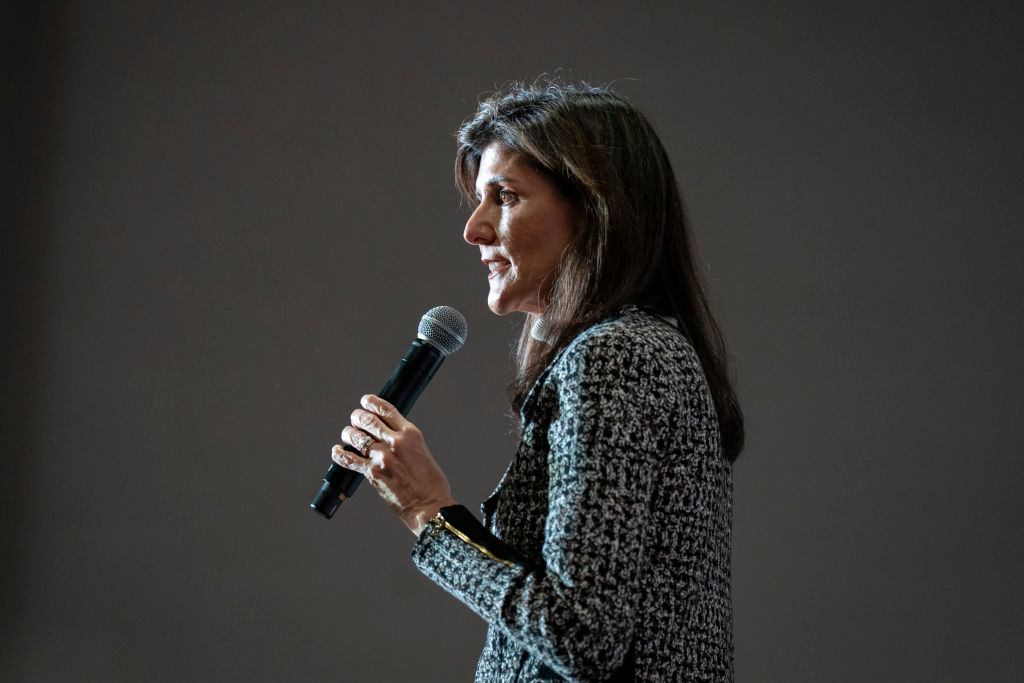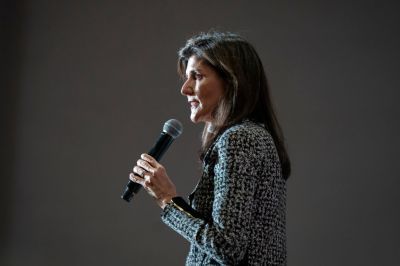Happy Wednesday! Imagine our embarrassment when, after all this work we’ve done covering the various angles of the 2024 presidential race, we discovered this week it’s all going to come down to an endorsement from Taylor Swift.
Up to Speed
- Republican megadonor Ken Griffin contributed $5 million to SFA Inc., the super PAC supporting Nikki Haley’s presidential bid, earlier this month, Puck News’ Teddy Schleifer reported Tuesday. Haley is waging an underdog bid for the GOP presidential nomination against former President Donald Trump but continues to raise resources from wealthy donors hoping the former South Carolina governor and ex-U.S. ambassador to the United Nations might pull off an upset.
- Trump is beginning to receive more support from wealthy Republican donors who had been hoping for a new GOP standard bearer in 2024, Politico’s Alex Isenstadt reports. On Thursday, billionaire investor John Paulson is hosting a gathering in Palm Beach, Florida, for the former president, with GOP financiers expected to attend. This comes on the heels of Trump courting major Republican donors while in Las Vegas for a campaign rally. Warming relations between Trump and the party’s wealthy contributors come on the heels of his victories in the Iowa caucuses and New Hampshire primary.
- A Republican legislator in Arizona is proposing a change to the state constitution that would allow the Legislature to overrule the will of the voters in presidential elections. Currently, Arizona’s votes in the Electoral College go to the presidential candidate who wins the general election in that state. But under state Sen. Anthony Kern’s proposal, Senate Concurrent Resolution 1014, the Legislature “would have the sole authority to appoint the presidential electors—regardless of which candidate actually received the most votes,” Arizona Public Radio reports. If the measure is approved by the Legislature it would then go before the voters, possibly this November.
- The designated super PAC supporting President Joe Biden’s reelection bid is booking $250 million in advertising on television and digital platforms in seven crucial battleground states, the New York Times reports. The group, Future Forward, says the ads will begin running in Arizona, Georgia, Michigan, Nevada, North Carolina, Pennsylvania, and Wisconsin the day after the Democratic convention in Chicago concludes August 22 and continue through Election Day, November 5.
- Biden in February will visit East Palestine, Ohio, to assess federal recovery efforts one year after a major train derailment, television station WKBN reports. The accident caused environmental damage in this working class community in eastern Ohio, near the Pennsylvania border, and the federal government has been working with state and local authorities, and the Norfolk Southern railroad, to coordinate the cleanup and provide support to affected residents. Biden has been criticized, especially by Republicans, for not visiting East Palestine sooner.
Outside Group Pitches Dems: Keep Voting Haley

A political group urging independent and Democratic voters to vote for Nikki Haley in upcoming Republican primaries has the plans and the money to remain active through the GOP primary in Georgia on March 12—or at least as long as Haley remains “viable” against the clear frontrunner for the nomination, Donald Trump.
Robert Schwartz, the co-founder of PrimaryPivot, told The Dispatch Tuesday that the super PAC, together with its nonprofit arm PrimaryPower, raised about $700,000 before the New Hampshire primary and expects to have an additional $300,000 to $400,000 to spend on its efforts in South Carolina, Michigan, multiple Super Tuesday states, and Georgia. The group has not disclosed its donors.
PrimaryPivot was part of the effort in New Hampshire that pushed undeclared voters who lean toward Democrats to vote on the Republican slate in the first-in-the-nation primary. Schwartz admitted that the project came up short in his own expectations to get Haley within 10 points of Trump. But he added that Haley’s willingness to keep running has helped revive interest from the group’s donors.
“We think as long as Nikki Haley stays in the race, it makes sense to try to support her and damage Donald Trump in whatever way possible,” Schwartz said. “Honestly, we were thinking we were probably going to fold our efforts if Nikki Haley didn't get within single digits, but the spin and other things that have happened since then have given us … a reason to continue.”
The super PAC has hired two experienced South Carolina-based operatives, Tiffany James and Chris Richardson, to engage with media outlets and host events. Both James and Richardson worked on the Pete Buttigieg campaign in South Carolina in 2020. Schwartz said PrimaryPivot is going to focus its future work on earned media and less on the direct voter engagement it attempted in New Hampshire.
“While we think that door knocking and phone banking and all of that is very important to get a sense of the electorate, it’s more important to do mass media,” he said.
Schwartz acknowledged that South Carolina is a much tougher state for Democrats and Democratic-leaning independents to affect the Republican primary, which will be held on February 24. For starters, while there is no party registration in South Carolina, the state itself is overwhelmingly Republican. In 2016 more than 740,000 voters took part in the Republican primary, compared to 370,000 in the Democratic primary that year and nearly 540,000 cast in the 2020 Democratic primary.
And while there has not been a public independent poll of the South Carolina primary in nearly a month, Trump has a 30-point lead over Haley in the RealClear Politics poll average. Narrowing Trump’s advantage with Palmetto State Republicans by converting Democrats and independents is a tall order.
Asked about this outside effort to rally non-Republican support to Haley in the primaries, Haley spokeswoman Olivia Perez-Cubas told The Dispatch that while the campaign is unfamiliar with this effort, the GOP should be about “addition.”
“Trump lost races we should have won in 2018, 2020, and 2022,” Perez-Cubas said. “If Republicans want to start winning again, we have to start bringing in new voters, including conservatives, independents, and Democrats who are fed up with Joe Biden.”
Schwartz and PrimaryPivot will have a better understanding of their pool of gettable voters after South Carolina’s Democratic presidential primary on February 3. While Biden has nominal opposition from Rep. Dean Phillips and Marianne Williamson, the president is likely to win big in the state that turned his 2020 campaign around on his way to winning his party’s nomination.
South Carolina has true open primaries—meaning anyone can participate in either party’s primary—but registered voters who vote in Saturday’s Democratic contest will be ineligible to vote in the Republican primary. That’s why, Schwartz says, the group plans to send more than 200,000 text messages to possible Democratic primary voters in South Carolina before Saturday to urge them to wait until the GOP primary. Then, any Democrat or Democratic-leaner in South Carolina who doesn’t cast a Democratic ballot this weekend will continue to be a target for PrimaryPivot’s message.
“We’d encourage them to think strategically about which primary matters the most, but in particular, if they don’t vote on February 3, there’s no excuse for them not voting on February 24,” said Schwartz. “It’s a question of staying home or voting against Trump. We’re going to do everything we can to make sure that they vote against Trump.”
The bigger opportunities to carve into Trump’s dominance, Schwartz said, are in Michigan, which holds its primary on February 27, and on Super Tuesday, March 5.
“I think the most promising state on Super Tuesday is Virginia, because it’s a totally open primary and [Marco] Rubio only lost by 2.8 percent[age points] in 2016,” Schwartz said. “It’s just highly educated, highly suburban, large numbers of federal workers and military, you know. It’s a state that was favorable to Youngkin, and we think it’d be favorable to another reasonable southern governor. It’s never been a state that’s been a huge fan of Donald Trump.”
Throw in other states like Massachusetts, Vermont, Maine, Colorado, and Minnesota, he added, and there’s a path for Democratic-leaning voters to help Haley close the gap or even win in several Super Tuesday states. Then, on March 12, comes the open primary in Georgia—another suburb-heavy state that Trump lost in the 2020 general election.
“So if Nikki Haley could somehow, you know, shock Trump in Georgia, there would be significant questions about the viability of Donald Trump,” Schwartz added.
All of this depends on Haley staying in the race that long, and she could withdraw from the fight after a significant loss in South Carolina. By Haley’s own stated threshold, she’ll need to do better in her home state than the 43 percent she got in New Hampshire.
“It more depends on Nikki Haley than what we do,” Schwartz allowed.
Notable and Quotable
“I’ve done all I can do. Just give me the power. I’ve asked from the very day I got into office. Give me the Border Patrol. Give me the people, the judges, give me the people who can stop this and make it work rationally.”
—President Joe Biden on whether he’s exhausted the unilateral actions he could take to help secure the southern border, January 30, 2024







Please note that we at The Dispatch hold ourselves, our work, and our commenters to a higher standard than other places on the internet. We welcome comments that foster genuine debate or discussion—including comments critical of us or our work—but responses that include ad hominem attacks on fellow Dispatch members or are intended to stoke fear and anger may be moderated.
With your membership, you only have the ability to comment on The Morning Dispatch articles. Consider upgrading to join the conversation everywhere.